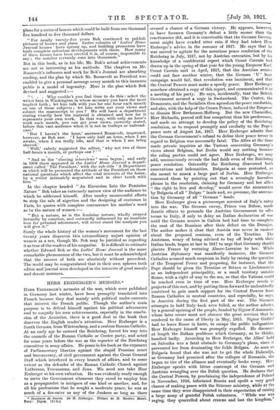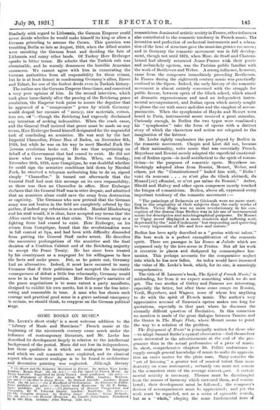HERR ERZBERGER'S MEMOIRS.*
HERR ERZBERGER'S memoirs of the war, which were published in Germany last winter, have been promptly translated into French because they deal mainly with political under-currents that interest the French public. Though the author's main purpose is to defend himself against his political adversaries and to magnify his own achievements, especially in the conclu- sion of the Armistice, there is a good deal in the book that deserves the English reader's attention. Herr Erzberger is a South German, from Wiirtemberg, and a zealous Roman Catholic. At an early age he entered the Reichstag, forced his way into the councils of the Roman Catholic or Centre party, and acted for some years before the war as the reporter of the Reichstag committee in army affairs. He poses in his book as the exponent of Parliamentary liberties against the stupid Prussian court and bureaucracy, of civil government against the Great General Staff which interfered in every branch of affairs, and to some extent as the defender of the Roman Catholic Church against Lutherans, Freemasons, and Jews. We need not take Herr Erzberger at his own valuation. Ho was evidently ready enough to serve the Government whenever they eared to employ him as a propagandist in intrigues of one kind or another, and, for all his professions that he sought a moderate peace, he was as much of a fire-eater as any of the Junkers so long as there • Souvenirs de Guerra. De 11. Erzberger. Preface de M. Maurice Hunt. Paris: Pap* [1211.) seemed a chance of a German victory. He appears, however, to have foreseen Germany's defeat a little sooner than the reactionaries did, and it is conceivable that the German Govern. ment might have evaded utter ruin if they had taken Herr Erzberger's advice in the summer of 1917. He says that he was moved to agitate for the notorious peace resolution of the Reichstag in July, 1917, not by Austrian entreaties, but by his knowledge of a confidential report which Count Czernin had drawn up in the spring of that year for the young Emperor Karl. Count Czernin said in April, 1917, that the Austrian armies could not face another winter, that the German ' U ' boat campaign would fail, that revolution was imminent, and that the Central Powers must make a speedy peace. Herr Erzberger somehow obtained a copy of this report, and communicated it to a meeting of his party. He says, incidentally, that the British Government secured a copy in Switzerland. The Centre, the Democrats, and the Socialists then agreed on the peace resolution, and also, with the help of the Crown Prince, induced the Emperor to dismiss Herr Bethmann-Hollweg. But the new Chancellor, Herr Michaelis, proved still less competent than his predecessor, and made no attempt to develop the policy of the Reichstag resolution, or to respond promptly and cordially to the Pope's peace note of August 1st, 1917. Herr Erzberger admits that the German Government's refusal to define their peace terms in regard to Belgium was necessarily fatal. The Allies at the time made private inquiries at the Vatican concerning Germany's views about Belgium, but Berlin would say nothing because the ruling parties could not agree. Herr Erzberger, we may add, unconsciously reveals the bad faith even of the Reichstag peace resolution. Ostensibly the Reichstag disavowed both annexations and indemnities. Bulgaria at once protested, as she meant to annex a large part of Serbia. Herr Erzberger reassured them by pointing out that a seemingly harmless phrase in the resolution, claiming for Germany and her allies "the right to live and develop," would cover the annexation by Bulgaria of all " Bulgar "lands and, we presume, the annexa- tion by Germany of all " German " lands.
Herr Erzberger gives a picturesque account of Italy's entry into the war. The German envoy, Prince von Billow, made frantic efforts to persuade the Austrian Government to offer terms to Italy, if only to delay an Italian declaration of war until the German armies in Galicia had had time to complete the rout of the Russians after their defeat on the Dunajce. The author makes it clear that Austria was never in earnest about the proposed cessions, even of the Trentino. The Austrians, weary of being advised to buy off Italy with their Italian lands, began at last in 1917 to urge that Germany should placate France by restoring Alsace-Lorraine to her. While Austrian diplomacy was manifestly insincere, the German Catholics aroused much suspicion in Italy by raising the question of the Temporal Power and proposing, for instance, that the Pope should be given the Trentino or Brixen or Liechtenstein as an independent principality, or a small territory outside Rome, with a right of way to the sea, so that the Vatican could be reached even in time of war. Herr Erzberger revels in projects of this sort, and by putting them forward he undoubtedly contrived to gain much support for the Central Powers from Roman Catholics in neutral countries, and especially, he says, in America during the first part of the war. The German attempts to hold Italy back were foiled, as the author admits, by a general uprising of the people, headed by Signor d'Annunzio, whose later errors must not obscure the great services that he rendered to the cause of liberty in May, 1915. Signor Giolitti had to leave Rome in haste, to escape the public indignation. Herr Erzberger himself was promptly expelled. He discusses at length the Balkan problems which Germany, as he thinks, handled badly. According to Herr Erzberger, the Allies' hold on Salonika was a fatal obstacle to Germany's plans, since it prevented her from dominating the fickle Bulgars. As soon as Bulgaria found that she was not to get the whole Dobrudja, as Germany had promised after the collapse of Rumania, she began to tire of the alliance and eventually broke away. Herr Erzberger speaks with bitter contempt of the German and Austrian wrangling over the Polish question. He declares that the Central Powers, by proclaiming the independence of Poland in November, 1916, infuriated Russia and spoilt a very good chance of malting peace with the Stunner ministry, while at the same time they were disappointed in their expectation of raising a large army of grateful Polish volunteers. "While war was raging, they quarrelled about crowns and lost the kingdom." Similarly with regard to Lithuania, the German Emperor could never decide whether he would make himself its king or allow a German princeling to assume the Crown. This question was troubling Berlin as late as August, 1918, when the Allied armies were smashing the German front and deciding the fate of Lithuania and many other lands. Of Turkey Herr Erzberger speaks in bitter terms. He admits that the Turkish rule was abominable, and he warmly denounces the horrible Armenian massacres. We cannot agree with him in exonerating the German authorities from all responsibility for those crimes, but he is at least honest in condemning Germany's allies, Enver and Waal, for one of the foulest deeds even in Turkish history.
The author saw the German Emperor three times, and conceived a very poor opinion of him. In the second interview, which took place immediately after the passing of the Reichstag peace resolution, the Emperor took pains to assure the deputies that he approved of a " compromise " pace by which Germany would despoil her enemies of "money, raw materials, cotton, iron ore, oil "—though the Reichstag had expressly disclaimed any intention of seeking indemnities. When the crash came, and the General Staff insisted that peace must be made on any terms, Herr Erzberger found himself designated for the ungrateful task of concluding an armistice. He was sent by the last Imperial Chancellor, Prince Max of Baden, on November 6th, 1918, but while he was on his way to meet Marshal Foch the 3erman revolution broke out. He was thus negotiating on behalf of a Government that had ceased to exist. He did not know what was happening in Berlin. When, on Sunday, November 10th, 1918, near Compiegne, he was doubtful whether he could sign the armistice conditions laid down by Marshal Foch, he received a telegram authorizing him to do so, signed simply "Chancellor." It turned out afterwards that the General Staff had sent this message on its own responsibility, as there was then no Chancellor in office. Herr Erzberger declares that the General Staff was in utter despair, and admitted that an armistice alone could save the army from destruction or captivity. The Germans who now pretend that the German army was not beaten in the field are completely refuted by the author, if indeed any refutation is needed. Marshal Hindenburg and his staff would, it is clear, have accepted any terms that the Allies cared to lay down at that crisis. The German army as a fighting force had ceased to exist. Herr Erzberger, on his return from Compiegne, found that the revolutionariea were in full control at Spa, and had been with difficulty dissuaded from putting the General Staff under arrest. He describes the successive prolongations of the armistice and the final decision of a Coalition Cabinet and of the Reichstag majority to accept the Peace Treaty. He has since been treated by his countrymen as a scapegoat for his willingness to face the facts and make peace. But, as he points out, Germany Lad no alternative. Indeed, it must have occurred to many Germans that if their politicians had accepted the inevitable consequences of defeat a little less reluctantly, Germany would now be in a far better position. Herr Erzberger's narrative of the peace negotiations is to some extent a party manifesto, designed to exhibit his own merits, but it is none the less inter- esting and reasonable in tone. A man who has shown such courage and practical good sense in a grave national eniergency is certain, we should think, to reappear on the German political stage.



































 Previous page
Previous page